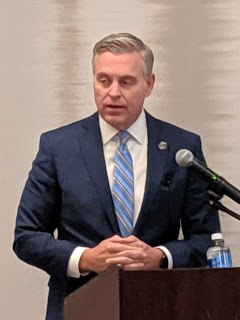‘Stop using this criminal-justice hammer to address a public-health nightmare,’ state justice and public safety secretary says of drugs

Justice Secretary John Tilley at workshop
—–
By Melissa Patrick
Tilley, a Democrat, was instrumental in getting syringe-exchange programs in a big anti-heroin bill when he was chair of the state House Judiciary Committee. Late in the year, Republican Gov. Matt Bevin named him justice secretary. He has often been mentioned as a possible holdover with Democratic Gov.-elect Andy Beshear.
Tilley, 50, spoke at Covering Substance Abuse and Recovery: A Workshop for Journalists, sponsored by the University of Kentucky‘s Institute for Rural Journalism and Community Issues and Oak Ridge Associated Universities.
He told the journalists at the Marriott Delta Hotel that it is time to stop criminalizing substance-use disorders, and that it is long past time to take a public-health approach that focuses on recovery and treatment.
He said the only logical explanation for the state’s prison population growing from 3,000 in 1970 to more than 24,000 today, or 702 percent – when the state’s population has only grown by 39% – is “the war on drugs.”
He said the state needs to start funding things that will provide a better return on investment, such as better community supervision for the 50,000 people who are either on probation or parole, and increased access to drug treatment and programming such as job-skills training.
Kentucky has 135,000 children who have been affected by incarceration, more than any other state, and the “vast majority” of the nearly 10,000 children in the foster-care system have had a parent in prison, he said, adding that the state ranks third for per-capita incarceration of women.
Tilley also talked about the challenges of recovery and addiction, pointing to a Harvard University study that found it takes a person with a drug addiction four or five tries at treatment over eight years to gain one year of sobriety.
“There’s an idea that we should give folks a second chance,” he said. “Well, what we know by the very nature of addiction is that it is a disease of relapse. So why would we just give someone a second chance?”
He said many of the state’s judges need more education about addiction, along with more resources. For example, he said that while he is a big fan of pre-arrest diversion, for that to work, crisis-stabilization locations are needed for people who are in distress. “The idea that putting someone in jail is a lifesaver is such a fallacy,” he said.
He also called for reform of state criminal-justice laws, saying 1,500 people in Kentucky are serving state prison time solely for simple possession alone, not trafficking, and the state has the most liberal and misused definition of trafficking, “any transfer.” He told of a woman who is serving five years for giving someone two pills.
“We can hold people accountable without state prison time,” he said. “Justice doesn’t always equal punishment.”
He said the focus needs to be on prevention, getting rid of the demand for the drugs – because no matter how many traffickers Kentucky puts in jail, as long as there is demand, another trafficker will follow.
He asked, “Why don’t we remove the criminal justice system and let public health and let our medical professionals and our treatment professionals and our mental health professionals try to dig us out of this mess?”
Tilley ended his discussion on a positive note, pointing out that while the rest of the nation saw a 5% reduction in its drug overdose deaths, Kentucky’s drop was 15%. Tilley attributed much of this drop to the state’s aggressive harm-reduction efforts, including its wide distribution of naloxone, a drug that reverses the effect of overdoses,
He added that the partnership between the Cabinet for Health and Family Services and the criminal justice system has been recognized nationwide. “When you pull back the curtain,” he said, “there are so many stories to tell.”